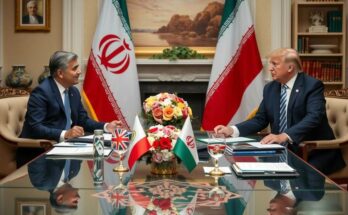Jaishankar’s UNGA speech highlighted India’s resolve against Pakistan’s double-game and the demand for modifications to the Indus Water Treaty due to cross-border terrorism. He stressed India’s response will extend beyond military action and linked Pakistan’s economic hardships to religious radicalization, establishing a position of firmness ahead of the upcoming SCO summit in Pakistan.
External Affairs Minister Subrahmanyam Jaishankar delivered a significant speech at the United Nations General Assembly (UNGA), directly addressing Pakistan’s consistent double-game in its dealings with India. His comments followed India’s formal request for modifications to the 1960 Indus Water Treaty, which has been adversely affected by endemic cross-border terrorism from Pakistan in Jammu and Kashmir, thereby compromising India’s water rights. Pakistan has not yet responded to India’s notification sent on August 30, 2024. In his address, Minister Jaishankar emphasized that India reserves the right to respond to Pakistan’s actions beyond mere military measures. This statement was particularly poignant considering its timing, just before the anniversary of India’s surgical strikes in occupied Kashmir in 2016. Jaishankar highlighted how Pakistan’s Prime Minister Shehbaz Sharif has attempted to draw dubious parallels between Gaza and Kashmir, which the Indian Minister dismissed by underscoring Pakistan’s reliance on Islamist narratives. Jaishankar articulated that Pakistan’s economy is now significantly influenced by the level of religious radicalization within its borders. He underscored that India is prioritizing the reclamation of occupied Kashmir and dismantling Pakistan’s terror machinery. This stance serves as a crucial message ahead of Jaishankar’s expected attendance at the Shanghai Cooperation Organization (SCO) summit in Pakistan in mid-October. The minister’s remarks also conveyed a strong signal to both Pakistan and its sympathizers in India that the government under Prime Minister Narendra Modi is fully aware of Islamabad’s deceitful tactics. Historically, Pakistan has claimed it desires dialogue with India, yet it has continued its hostile rhetoric and actions. Jaishankar’s position suggests that any future diplomatic engagements will not shy away from a more direct and robust Indian response to Pakistani provocations. Moreover, Jaishankar has reiterated that any dialogue with Pakistan is contingent upon the cessation of cross-border terrorism originating from Pakistan. In a poignant remark, he noted that it is ‘Karma’ that has reduced Pakistan to its current state of economic turmoil.
The context of Minister Jaishankar’s speech lies in India’s ongoing concerns regarding cross-border terrorism emanating from Pakistan, particularly in relation to the Jammu and Kashmir region. The Indus Water Treaty, established in 1960, allows for the hydroelectric and irrigation use of the river systems that flow from India into Pakistan, yet has been a point of contention due to ongoing terrorist activities. Pakistan has traditionally used international forums to criticize India while attempting to present itself as a victim of the situation. This dynamic has created a complex geopolitical environment where India seeks to assert its water rights and respond firmly to Pakistan’s aggressive rhetoric.
In summary, External Affairs Minister Subrahmanyam Jaishankar’s speech at the UNGA underscores India’s unwavering stance against Pakistan’s duplicity and its commitment to addressing cross-border terrorism. By definitively stating that Pakistan’s economic state is a product of its excessive radicalization and emphasizing the primacy of ending terrorism for dialogue, Jaishankar has reinforced India’s position in the region. The Modi government’s clear understanding of Pakistan’s tactics marks a pivotal moment in India’s foreign policy as it prepares for future engagements.
Original Source: www.hindustantimes.com




